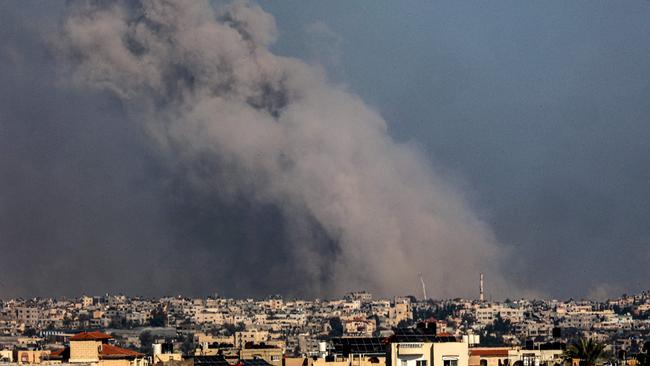Israeli strike kills five Iranian military advisers in Syria: Tehran
US base in Iraq also was fired on as Israel and Jordan clash over an alleged Israeli attack on a Jordanian field hospital in Gaza.

A US base in Iraq came under fire Saturday and an Israeli strike in Syria killed five members of Iran’s Revolutionary Guard in the country, in the latest signs that the war in Gaza is spreading across the region.
Multiple ballistic missiles hit Al-Asad Airbase, causing minor injuries among US and coalition personnel and severely wounding an Iraqi Security Forces service member, said a US defence official. Some of the missiles were intercepted by air defence systems.
The Iran-backed Islamic Resistance in Iraq took responsibility for barrage. The attack occurred hours after a strike on a residential building in Damascus, according to the Syrian news agency SANA. The strike, which both Iran and Syria blamed on Israel, is one of many directed in recent weeks at increasingly aggressive Iranian-backed groups that Tehran has used to project power in the Middle East.
The Israeli military declined to comment on the strike.
Iranian President Ebraham Raisi condemned the air strike and promised retaliation against Israel.
Iran identified five of the victims as Hojattollah Omidvar, Ali Aghazadeh, Hossein Mohammadi, Mohammad-Amin Samadi and Saeed Karimi, all members of Iran’s Revolutionary Guard Corps. If confirmed, the incident would be one of Israel’s highest-profile strikes on Iranian assets abroad since the start of the Gaza war.
Omidvar was believed to be in charge of Iran’s program of ferrying of weapons between Syria and Iraq, said Firas Maksad, senior fellow at the Washington-based Middle East Institute think tank.
“We’re seeing that the battle fronts are becoming increasingly interconnected, which increases volatility in the region,” he said. “So the strikes could be related.”
Israel believes it is already fighting a multi-front war against an array of Iranian-backed groups across the Middle East. Those organizations, such as Lebanon’s Hezbollah and the Houthis of Yemen, have been attacking Israel and U.S. interests as Tehran works to project increased power.
Israel has for years struck Iran-backed targets in Syria, but the tempo of those strikes has increased since Hamas’s October 7 incursion into southern Israel and Israel’s ensuing Gaza invasion. A similar strike last month killed a senior adviser in Iran’s revolutionary guards in Syria. “Israel is working to restore deterrence that it believes was lost following October. 7,” said Maksad.
Israel has worked to grapple with the intelligence failures that allowed Hamas fighters to cross into southern Israel where they killed around 1200 Israelis, mostly civilians.
Longstanding tensions between Israel and Iran have deepened since Octobre 7. Israel has also been squaring off in nearly daily skirmishes with Hezbollah, a US-designated terrorist group, in a showdown that threatens to create another front in Israel’s northern frontier.
Hezbollah said one of its fighters was killed by an Israeli attack on Saturday. Hezbollah officials identified the man as Ali Muhammad Haderaj, a senior commander in the Palestine branch of the Iranian Quds Force, operating under Hezbollah. Haderaj, who was killed in a strike in Tsur, south of Lebanon, was responsible for providing intelligence assistance to Hamas.
News of the strike in Syria came after Israel denied it had struck a Jordanian field hospital in Gaza’s city of Khan Younis, now the focal point of the country’s efforts to root out Hamas, also a US-designated terrorist group. Israel said it had fired at militants near one of the few remaining healthcare centres available to Gazans.
The Jordanian military said in recent days that Israel fired directly on the hospital and a bunker where staff were sheltering, causing substantial damage and injuring a Jordanian officer and a Palestinian, after blocking the hospital gate with a tank. The officer was flown back to Jordan for treatment, it said.
The incident cast light on a little-known aspect of the war in Gaza: the presence, tolerated by Israel, of medics from nearby Arab nations to provide what are among the last sources of healthcare for civilians in the strip. Alongside Jordan, the United Arab Emirates has opened a similar hospital and Qatar is in the process of setting one up.
“The IDF’s presence in the area of the hospital was co-ordinated in advance with the relevant authorities,” the Israeli armed forces said Saturday, using the acronym for the Israel Defence Forces. “The IDF did not strike the Jordanian field hospital in Khan Younis.” It said Israeli forces had targeted militants adjacent to the facility and that the source of the gunfire that injured a staff member was unclear. The statement said the hospital was fully functioning.
The incident and conflicting accounts underscore the difficulty Israel faces in fighting an enemy that has become a part of Khan Younis’s chaotic urban landscape. They could also fuel criticism in the West and in Arab nations that Israel is acting too indiscriminately in its campaign.
France on Saturday condemned what it described as the strike on the field hospital and praised Jordan for its effort to help civilians in Gaza, which it said Paris had supported logistically.
T

he episode has strained already tense relations between Israel and its neighbour Jordan, which maintains two field hospitals in the Gaza Strip, one in the north and another in Khan Younis, which has become the centre of fighting but also the destination for many of the 90 per cent of Gazans displaced by the war.
With the majority of Gaza’s healthcare system destroyed by Israeli bombardment, regional Arab states have stepped in to provide field hospitals to care for the wounded. The Jordanian hospital is a complex of tents with operating theatres and incubators, providing a reliable level of healthcare in the midst of the conflict. Palestinian doctors in Gaza have said they have had to, in some cases, amputate limbs without anaesthesia.
Jordan has historically had close security ties with Israel, and the kingdom was the second Arab state after Egypt to sign a peace accord with Israel, in 1994. But relations have cooled under the right-wing government of Israeli Prime Minister Benjamin Netanyahu, and Jordan withdrew its ambassador following Israel’s invasion of Gaza.
While the Arab states have co-ordinated their presence with Israel, the field hospitals have become part of the backdrop in which Israeli soldiers say it has become increasingly difficult to discriminate between militants and civilians.
Militants from Hamas and Islamic Jihad in Khan Younis move around without uniforms, integrated into the swollen numbers of civilians sheltering within the city limits, say Israeli soldiers. Israel has focused its ground efforts on taking the eastern and southern portions of the city, locating and dismantling tunnels, seizing intelligence from raids on command posts, and hunting Hamas’s senior leadership.
Israel’s broadest fighting force is deployed in the area around the city. On Saturday, the Israeli military said it had conducted a targeted raid to destroy rocket-launching infrastructure and clashed with militants.
Tactical achievements in Gaza’s north have yet to convert into strategic wins, and Israel has made significant troop drawdowns without cementing operational control over the northern portion of the strip.
The Israeli military said Saturday that its forces were continuing to find infrastructure used by militants to fire rockets into Israel. Militants also continue to operate in northern Gaza, despite Israel claiming to have broken Hamas’s formal command-and-control structure in the area. The military said it had engaged with fighters who were attempting to plant explosives and operate antitank missile launchers.
Earlier this week, Rear Admiral Daniel Hagari, the Israeli military’s head spokesman, said that forces remaining in northern Gaza were focused on counterterror raids.
“This is the same terror that remains after significant action was taken in the north of Gaza to dismantle terrorist infrastructure,” Hagari said on Wednesday.
—Aresu Eqbali and Adam Chamseddine contributed to this article.
The Wall Street Journal


